ERDF program NRW 2014-2020 - Priorities of the old funding period
Program texts for the ERDF program NRW 2014-2020
The basic program texts for the North Rhine-Westphalia Operational Program for the promotion of investments in growth and employment from the European Regional Development Fund (OP ERDF NRW) for the 2014-2020 funding period provide information on the content, priorities and framework conditions.

OP EFRE NRW 2014–2020 (Stand Februar 2022)
Lesen Sie hier das offizielle von der Europäischen Kommission genehmigte Programm für die Förderperiode 2014–2020.
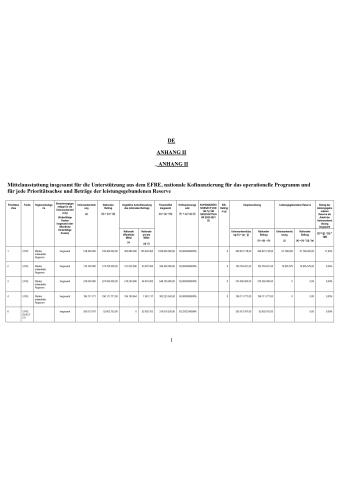
Mittelausstattung für die Unterstützung aus dem EFRE
Das Dokument listet die Mittelausstattung für die Unterstützung aus dem EFRE, nationale Kofinanzierung für das operationelle Programm und für jede Prioritätsachse und Beträge der leistungsgebundenen Reserve auf.
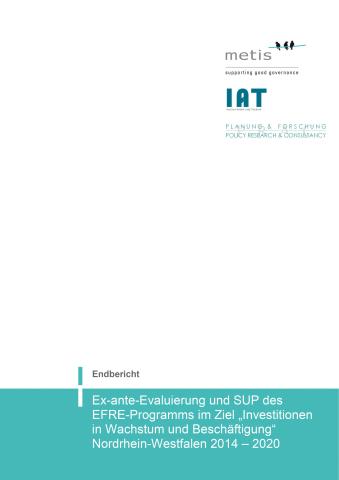
Ex-ante-Evaluierung des EFRE-Programms
Der Programmerstellungsprozess vom OP EFRE NRW wurde durch eine Ex-ante-Evaluierung begleitet. Die wesentlichen Aufgaben der Ex-ante-Evaluierung sind eine präzise Beschreibung aller Methoden, die eingehende Überprüfung der Machbarkeit, die klare Formulierung von Indikatoren sowie eine genaue Überprüfung des Finanzsystems. Die detaillierten Ergebnisse der Ex-ante-Evaluierung gibt es hier zum Download.
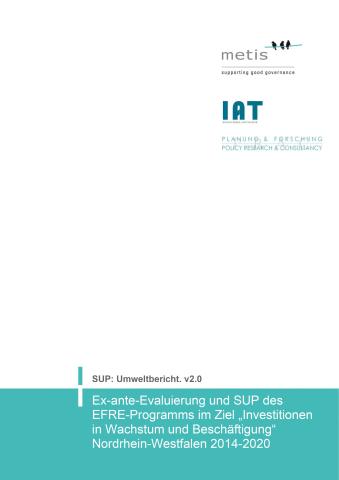
Strategische Umweltprüfung: Endbericht
Die Strategische Umweltprüfung (SUP) zeigt, welche positiven Auswirkungen das OP EFRE NRW 2014–2020 auf die Umwelt Nordrhein-Westfalens haben kann. Lesen Sie mehr zu den umweltpolitischen Auswirkungen des Programms sowie Ausblicke zu Nutzen und Chancen im SUP-Endbericht.
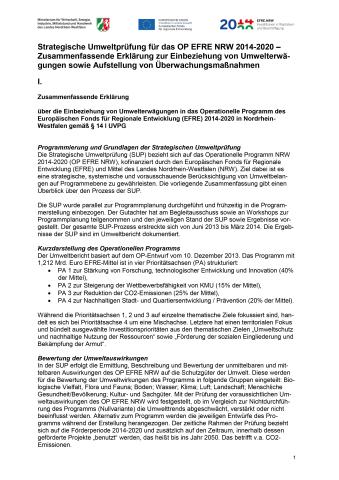
Strategische Umweltprüfung: Zusammenfassende Erklärung
Die Strategische Umweltprüfung (SUP) zeigt, welche positiven Auswirkungen das OP EFRE NRW 2014–2020 auf die Umwelt Nordrhein-Westfalens haben kann. Lesen Sie mehr zu den umweltpolitischen Auswirkungen des Programms sowie Ausblicke zu Nutzen und Chancen im SUP-Endbericht.
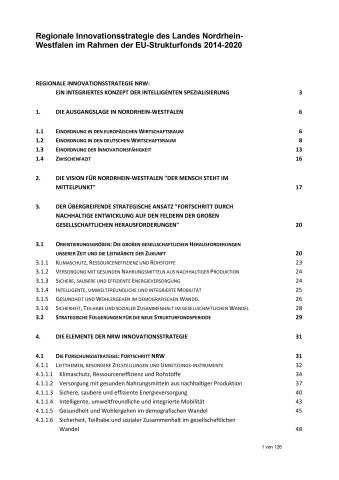
Innovationsstrategie NRW
Die regionale Innovationsstrategie des Landes Nordrhein-Westfalen im Rahmen der EU-Strukturfonds 2014–2020 verknüpfte die Forschungs-, Leitmarkt- und Transferstrategie des Landes NRW in einem gemeinsamen Konzept. Sie leistete damit einen wichtigen Beitrag für die Nachhaltigkeitsstrategie NRWs. Der Leitgedanke lautete „intelligente Spezialisierung“: Es wurde sich auf die Zukunftsfelder konzentriert, die von besonderer Relevanz für Wirtschaft und Bevölkerung sind und bei denen Unternehmen und Forschungseinrichtungen Stärke und Potenziale aufweisen.
Framework guidelines for the ERDF program NRW 2014-2020
The ERDF Framework Directive (ERDF RD) for the 2014-2020 funding period came into force on November 28, 2014. It harmonized EU and national law. The ERDF Framework Directive and the associated General Auxiliary Provisions for Grants for Project Funding using ERDF Funds (ANBest-EFRE) applied to all grants from the ERDF NRW 2014-2020 OP. The state government adopted the first measures to simplify ERDF funding in the 2014-2020 funding period with a cabinet decision on June 6, 2013. These included, for example, the introduction of lump sums for personnel expenses and the simplification of public procurement law.
List of projects for the 2014-2020 funding period
The list of projects for the funding period is an instrument for maximum transparency and has been updated twice a year. As no further approvals are made, the status of the list of projects is frozen at 31.03.2024 and is therefore to be regarded as finally valid. By accepting the funding, all beneficiaries have agreed to appear on this list.
The list of projects for the 2014-2020 funding period contains the following information:
- name of the beneficiary (legal entities only),
- name of the project,
- summary of the project,
- start date and expected end date of implementation,
- total amount of eligible expenditure of the project,
- area code number of the project and
- name of the EU intervention category.

Liste der Vorhaben Förderperiode 2014–2020
In der Liste finden Sie alle im EFRE-Programm NRW geförderten Vorhaben aus der Förderperiode 2021-2020.
The regional effect of ERDF funding is of particular interest, which is why the list of projects for the 2014-2020 funding period is also provided separately in nine regional clusters. The division of the projects into the nine individual tables is based on the nine regions represented by the Regionen.NRW association.
Please note that there are overlaps in the division of the regions and that individual districts (e.g. Rhein-Kreis Neuss) are included more than once. For data protection reasons, the approvals of the advisory program for business and the master craftsman start-up premium as well as from the promotion of measures for CHP systems are shown individually, but - as it concerns natural persons - anonymously.
Priority axes
In the 2014-2020 funding period, the NRW ERDF program comprised five priority axes:
The aim in this area was to increase business investment in research and development, develop innovative products, services and processes and bring them to product maturity and subsequently to market. The focus was on lead markets in which NRW companies already hold strong positions and which also have good growth potential:
- Machinery and plant engineering / production technology
- New materials
- Mobility and logistics
- Information and communication industry
- Energy and environmental industry
- Media and creative industries
- Health
- Lifesciences
The priority axis "Strengthening research, technological development and innovation" included the following specific objectives:
- Increasing the implementation-oriented R&I potential (R&I = research and innovation)
- Improving the innovative capacity of companies
The priority axis "Strengthening research, technological development and innovation" comprised various calls.
- Lead market competition NeueWerkstoffe.NRW
- Leitmarktwettbewerb Gesundheit.NRW
- Leitmarktwettbewerb LifeSciences.NRW
- Leitmarktwettbewerb IKT.NRW
- Leitmarktwettbewerb CreateMedia.NRW
- Leitmarktwettbewerb EnergieUmweltwirtschaft.NRW
- Production.NRW lead market competition
- MobilityLogistics.NRW lead market competition call
- ResearchInfrastructures.NRW call for projects
- Regio.NRW call for funding NRW patent validation
Small and medium-sized enterprises (SMEs) are of great importance for innovation and jobs in NRW. However, their growth and innovation potential is not always fully exploited. This is why the NRW ERDF OP supported existing companies in making the best possible use of their potential for the future.
The priority axis "Increasing the competitiveness of small and medium-sized enterprises (SMEs)" comprised the following specific objectives:
- Increasing innovative and high-growth start-ups
- Increasing the added value of SMEs through skills development and funding support
- Increasing the competitiveness of SMEs through the development of innovative tourism infrastructure and services
The priority axis "Increasing the competitiveness of small and medium-sized enterprises (SMEs)" included the following calls:
- Call for projects START-UP Innovation Laboratories NRW
- Call for funding START-UP TRANSFER.NR
- Call for funding for START-UP university spin-offs NRW
- Call for projects "Competence centers for responsible corporate governance"
- Call for projects to secure skilled workers
- Call for projects "Erlebnis.NRW - Strengthening the tourism industry"
- Call for projects "Competence centers for women and work"
- Call for projects "Competence centers for women and work - Münsterland region"
- Call for projects Ressource.NRW
- Future through Innovation.NRW
The energy transition is an important goal in NRW - and a major challenge. This priority axis focused on the EU targets of initially reducing both greenhouse gas emissions and primary energy consumption (PEC) by 20 percent each - by promoting innovative projects of a pilot and model nature as well as measures to disseminate climate-friendly technologies and usage habits.
The priority axis "Promoting efforts to reduce CO2 emissions" included the following specific objectives:
- Reducing greenhouse gas emissions through the use of renewable energy
- Reducing greenhouse gas emissions in companies
- Reducing greenhouse gasemissions in cities and regions
- Efficient use of combined heat and power (CHP) in connection with heating and cooling networks
The priority axis "Reduction of CO2 emissions" comprised the following calls:
- Leitmarktwettbewerb EnergieUmweltwirtschaft.NRW
- Climate protection competition MunicipalClimateProtection.NRW
- Climate protection competition EnergySectorCoupling.NRW
- Climate protection competition EnergySystemChange.NRW
- Climate protection competition EnergyEfficiencyCompanies.NRW
- Climate Protection Competition EnergyEfficiencyRegion.NRW
- Climate Protection Competition RenewableEnergy.NRW
- Climate Protection Competition VirtualPowerPlants.NRW
- Climate Protection Competition HydrogenHyWay.NRW
In this priority axis of the NRW ERDF OP, the focus was on the idea of social prevention. This included making neighborhoods more liveable, alleviating social problems and improving people's educational and future opportunities.
The priority axis "Sustainable urban and neighborhood development / prevention" included the following specific objectives, which were based on the prevention strategy of the state of NRW and the NRW biodiversity strategy:
- Improving the integration of disadvantaged social groups into work, education and the community
- Ecological revitalization of neighbourhoods, cities and surrounding urban areas
- Development and preparation of brownfield and conversion sites for urban development or ecological purposes
- . ecological purposes
The priority axis "Sustainable urban and district development / prevention" included the following calls:
- Project call "Strong districts - strong people"
- Project call "Green infrastructure NRW"
The Covid-19 pandemic has hit Europe hard. With the REACT-EU program, the European Union has launched recovery aid to mitigate the economic and social consequences of the Covid-19 pandemic in Europe. The funding priorities were digital and green transformation. For example, EU funds were to flow into the digitalization of education, tourism and clinical health and medical research.
The "REACT-EU" priority axis comprised various calls:
- Digitalization of non-profit sports organizations in NRW
- InnovationEnvironmental Economy.NRW
- Digitalization of clinical medical and health research
- Green infrastructure
- Digitization of VHS and recognized further education institutions
- Digitization of research museums
- Digitization of family education centers
- Digitization of public libraries in NRW
- Digitization of rescue service schools
- Promotion of end devices for schools in NRW
- Digitalization in tourism
- Increasing climate resilience
- Emission-free commercial vehicles
- Digitalization of extracurricular learning locations zdi
- Digitalization in obstetrics and obstetrics care
Durchführung
Welche Fortschritte wurden in den unterschiedlichen Prioritätsachsen des EFRE-Programms NRW 2014–2020 erzielt? Wie viel Geld stand jeweils zur Verfügung? Und wie viele Vorhaben wurden bewilligt? Auskunft darüber und weitere Aspekte geben die Durchführungsberichte.
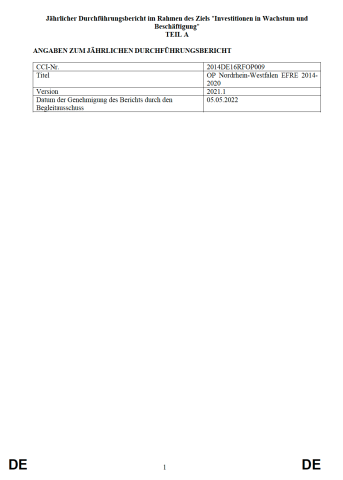
Durchführungsberichte 2016-2022
Die Dokumente informieren über den jeweiligen Stand der Durchführung des EFRE-Programms NRW 2014-2020 zu unterschiedlichen Zeitpunkten im Programmverlauf.
Rating
Ensuring effectiveness, further raising the level, fulfilling reporting obligations and highlighting the successes of programme implementation - these are the objectives of the evaluation for the ERDF NRW 2014-2020 operational programme. Among other things, the evaluations are intended to clarify the following questions:
- What effects have arisen in the funded projects?
- How did the funding contribute to the observable results?
- How efficient was the funding in light of the results?
- What can be done better in the future in terms of content, organization or structure?
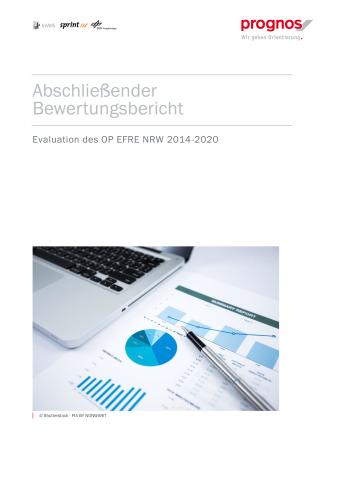
Bewertungsbericht: Evaluation des OP EFRE NRW 2014–2020
In diesem abschließenden Bewertungsbericht finden Sie die Kernergebnisse und Schlussfolgerungen aus den durchgeführten Evaluationen und Vertiefungsstudien: Unter anderem zum Beitrag der Innovationsförderung zur Entwicklung der NRW-Leitmärkte, zum Beitrag der Gründungsförderung zur Gründungsentwicklung in NRW, zum Beitrag der Tourismusförderung zur Steigerung der Wettbewerbsfähigkeit von KMU, zum Beitrag der Klimaschutzwettbewerbe zur Senkung des Treibhausgas-Ausstoßes sowie zur Verzahnung der EU-Fonds zur Stärkung des Präventionsziels im Rahmen der nachhaltigen Stadt- und Quartiersentwicklung.
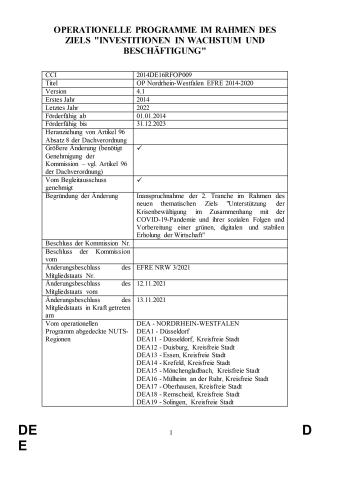
Evaluationsberichte und Zusatzstudien des OP EFRE NRW 2014–2020
Hier können Sie sich jeweils die Kurz- und Langfassung der Vertiefungs- und Zusatzstudien herunterladen:
- Beitrag der Innovationsförderung zur Entwicklung der NRW-Leitmärkte
- Beitrag der Gründungsförderung zur Gründungsentwicklung in NRW
- Beitrag der Tourismusförderung zur Steigerung der Wettbewerbsfähigkeit von KMU
- Beitrag der Klimaschutzwettbewerbe zur Senkung des Treibhausgas-Ausstoßes sowie zur Verzahnung der EU-Fonds zur Stärkung des Präventionsziels im Rahmen der nachhaltigen Stadt- und Quartiersentwicklung
- Umsetzung der Kommunikationsstrategie
- Folgeinvestitionen im Nachgang zu Beratungs- und Aufschließungsmaßnahmen sowie von Vernetzungsaktivitäten, insbesondere von Unternehmen
- Zusatzstudie: Vereinfachungspotenziale
- Zusatzstudie: Analyse territorialer Förderansätze im EFRE NRW
- Gutachten: Pauschalen
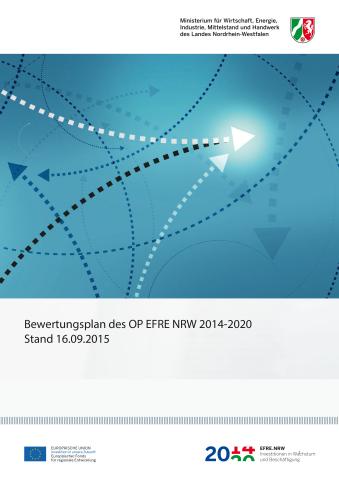
Bewertungsplan
Der Bewertungsplan beschreibt die Inhalte der Bewertungsarbeiten, mit denen die Wirksamkeit und Effizienz des Strukturfondseinsatzes beurteilt werden soll, sowie die Art und Weise ihrer Durchführung. Ausgewählte, spezifische Programme in allen Prioritätsachsen des OP EFRE NRW 2014–2020 werden evaluiert. Die Ergänzung des Bewertungsplans skizziert die Evaluation von REACT-EU.